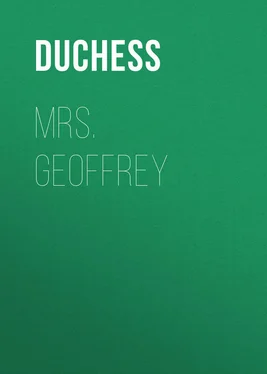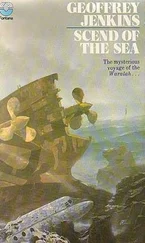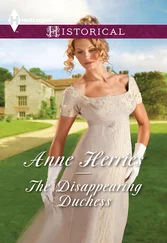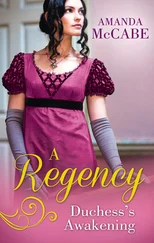Duchess - Mrs. Geoffrey
Здесь есть возможность читать онлайн «Duchess - Mrs. Geoffrey» — ознакомительный отрывок электронной книги совершенно бесплатно, а после прочтения отрывка купить полную версию. В некоторых случаях можно слушать аудио, скачать через торрент в формате fb2 и присутствует краткое содержание. Жанр: foreign_antique, foreign_prose, foreign_sf, на английском языке. Описание произведения, (предисловие) а так же отзывы посетителей доступны на портале библиотеки ЛибКат.
- Название:Mrs. Geoffrey
- Автор:
- Жанр:
- Год:неизвестен
- ISBN:нет данных
- Рейтинг книги:5 / 5. Голосов: 1
-
Избранное:Добавить в избранное
- Отзывы:
-
Ваша оценка:
- 100
- 1
- 2
- 3
- 4
- 5
Mrs. Geoffrey: краткое содержание, описание и аннотация
Предлагаем к чтению аннотацию, описание, краткое содержание или предисловие (зависит от того, что написал сам автор книги «Mrs. Geoffrey»). Если вы не нашли необходимую информацию о книге — напишите в комментариях, мы постараемся отыскать её.
Mrs. Geoffrey — читать онлайн ознакомительный отрывок
Ниже представлен текст книги, разбитый по страницам. Система сохранения места последней прочитанной страницы, позволяет с удобством читать онлайн бесплатно книгу «Mrs. Geoffrey», без необходимости каждый раз заново искать на чём Вы остановились. Поставьте закладку, и сможете в любой момент перейти на страницу, на которой закончили чтение.
Интервал:
Закладка:
"One may choose to forget, but one may not be able to accomplish it. To forget or to remember is not in one's own power."
"That is what fickle people say. But what one feels one remembers."
"That is true, for a time, with some. Forever with others."
"Are you one of the others?"
She makes him no answer.
"Are you ?" she says, at length, after a long silence.
"I think so, Mona. There is one thing I shall never get."
"Many things, I dare say," she says, nervously, turning from him.
"Why do you speak of people dropping out of your life?"
"Because, of course, you will, you must. Your world is not mine."
"You could make it yours."
"I do not understand," she says, very proudly, throwing up her head with a charming gesture. "And, talking of forgetfulness, do you know what hour it is?"
"You evidently want to get rid of me," says Rodney, discouraged, taking up his hat. He takes up her hand, too, and holds it warmly, and looks long and earnestly into her face.
"By the by," he says, once more restored to something like hope, as he notes her drooping lids and changing color and how she hides from his searching gaze her dark, blue, Irish eyes, that, as somebody has so cleverly expressed it, seem "rubbed into her head with a dirty finger," so marked lie the shadows beneath them, that enhance and heighten their beauty, – "by the by, you told me you had a miniature of your mother in your desk, and you promised to show it to me." He merely says this with a view to gaining more time, and not from any overwhelming desire to see the late Mrs. Scully.
"It is here," says Mona, rather pleased at his remembering this promise of hers, and, going to a desk, proceeds to open a secret drawer, in which lies the picture in question.
It is a very handsome picture, and Geoffrey duly admires it; then it is returned to its place, and Mona, opening the drawer next to it, shows him some exquisite ferns dried and gummed on paper.
"What a clever child you are!" says Geoffrey, with genuine admiration. "And what is here?" laying his hand on the third drawer.
"Oh, do not open that – do not!" says Mona, hastily, in an agony of fear, to judge by her eyes, laying a deterring hand upon his arm.
"And why not this or any other drawer?" says Rodney, growing pale. Again jealousy, which is a demon, rises in his breast, and thrusts out all gentler feelings. Her allusion to Mr. Moore, most innocently spoken, and, later on, her reference to the students, have served to heighten within him angry suspicion.
"Do not!" says Mona, again, as though fresh words are impossible to her, drawing her breath quickly. Her evident agitation incenses him to the last degree. Opening the drawer impulsively, he gazes at its contents.
Only a little withered bunch of heather, tied by a blade of grass! Nothing more!
Rodney's heart throbs with passionate relief, yet shame covers him; for he himself, one day, had given her that heather, tied, as he remembers, with that selfsame grass; and she, poor child, had kept it ever since. She had treasured it, and laid it aside, apart from all other objects, among her most sacred possessions, as a thing beloved and full of tender memories; and his had been the hand to ruthlessly lay bare this hidden secret of her soul.
He is overcome with contrition, and would perhaps have said something betraying his scorn of himself, but she prevents him.
"Yes," she says, with cheeks colored to a rich carmine, and flashing eyes, and lips that quiver in spite of all her efforts at control, "that is the bit of heather you gave me, and that is the grass that tied it. I kept it because it reminded me of a day when I was happy. Now," bitterly, "I no longer care for it: for the future it can only bring back to me an hour when I was grieved and wounded."
Taking up the hapless heather, she throws it on the ground, and, in a fit of childish spleen, lays her foot upon it and tramples it out of all recognition. Yet, even as she does so, the tears gather in her eyes, and, resting there unshed, transfigure her into a lovely picture that might well be termed "Beauty in Distress." For this faded flower she grieves, as though it were, indeed, a living thing that she has lost.
"Go!" she says, in a choked voice, and with a little passionate sob, pointing to the door. "You have done mischief enough." Her gesture is at once imperious and dignified. Then in a softer voice, that tells of sorrow, and with a deep sigh, "At least," she says, "I believed in your honor!"
The reproach is terrible, and cuts him to the heart. He picks up the poor little bruised flower, and holds it tenderly in his hand.
"How can I go," he says, without daring to look at her, "until, at least, I ask for forgiveness?" He feels more nervous, more crushed in the presence of this little wounded Irish girl with her pride and her grief, than he has ever felt in the presence of an offended fashionable beauty full of airs and caprices. "Mona, love makes one cruel: I ask you to remember that, because it is my only excuse," he says, warmly. "Don't condemn me altogether; but forgive me once more."
"I am always forgiving you, it seems to me," says Mona, coldly, turning from him with a frown. "And as for that heather," facing him again, with eyes shamed but wrathful, "I just kept it because – because – oh, because I didn't like to throw it away! That was all!"
Her meaning, in spite of her, is clear; but Geoffrey doesn't dare so much as to think about it. Yet in his heart he knows that he is glad because of her words.
"You mustn't think I supposed you kept it for any other purpose," he says, quite solemnly, and in such a depressed tone that Mona almost feels sorry for him.
He has so far recovered his courage that he has taken her hand, and is now holding it in a close grasp; and Mona, though a little frown still lingers on her low, broad forehead, lets her hand so lie without a censure.
"Mona, do be friends with me," he says at last, desperately, driven to simplicity of language through his very misery. There is a humility in this speech that pleases her.
"It is really hardly worth talking about," she says, grandly. "I was foolish to lay so great a stress on such a trifling matter. It doesn't signify, not in the least. But – but," the blood mounting to her brow, "if ever you speak of it again, – if ever you even mention the word 'heather,' – I shall hate you !"
"That word shall never pass my lips again in your company, – never, I swear!" says he, "until you give me leave. My darling," in a low tone, "if you could only know how vexed I am about the whole affair, and my unpardonable conduct! Yet, Mona, I will not hide from you that this little bit of senseless heather has made me happier than I have ever been before."
Stooping, he presses his lips to her hand for the first time. The caress is long and fervent.
"Say I am quite forgiven," he pleads, earnestly, his eyes on hers.
"Yes. I forgive you," she says, almost in a whisper, with a seriousness that amounts to solemnity.
Still holding her hand, as though loath to quit it, he moves towards the door; but before reaching it she slips away from him, and says "Good-by" rather coldly.
"When am I to see you again?" says Rodney, anxiously.
"Oh not for ever so long," returns she, with much and heartless unconcern. (His spirits sink to zero.) "Certainly not until Friday," she goes on, carelessly. (As this is Wednesday, his spirits once more rise into the seventh heaven.) "Or Saturday, or Sunday, or perhaps some day next week," she says, unkindly.
"If on Friday night there is a good moon," says Rodney, boldly, "will you take me, as you promised, to see the Bay?"
"Yes, if it is fine," says Mona, after a faint hesitation.
Читать дальшеИнтервал:
Закладка:
Похожие книги на «Mrs. Geoffrey»
Представляем Вашему вниманию похожие книги на «Mrs. Geoffrey» списком для выбора. Мы отобрали схожую по названию и смыслу литературу в надежде предоставить читателям больше вариантов отыскать новые, интересные, ещё непрочитанные произведения.
Обсуждение, отзывы о книге «Mrs. Geoffrey» и просто собственные мнения читателей. Оставьте ваши комментарии, напишите, что Вы думаете о произведении, его смысле или главных героях. Укажите что конкретно понравилось, а что нет, и почему Вы так считаете.












